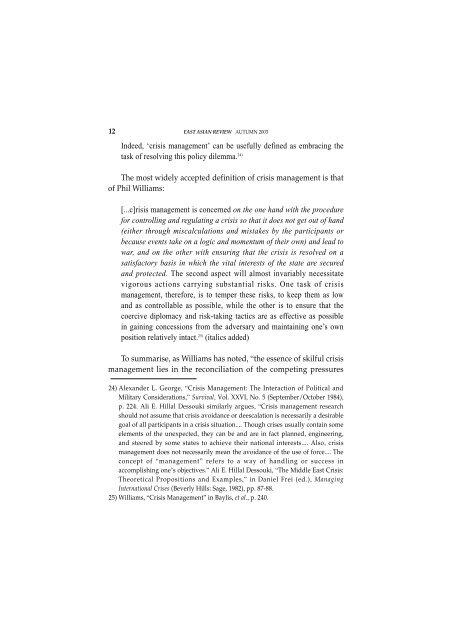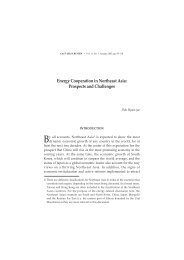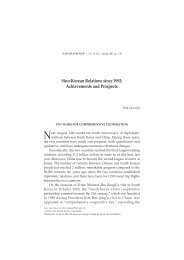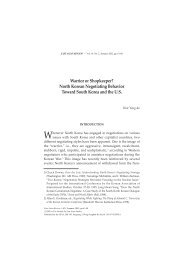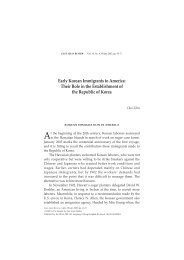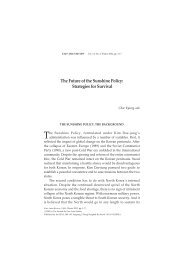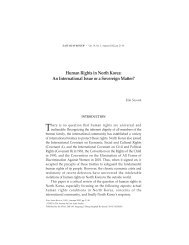Between Peace and War: South Korea's Crisis Management ...
Between Peace and War: South Korea's Crisis Management ...
Between Peace and War: South Korea's Crisis Management ...
Create successful ePaper yourself
Turn your PDF publications into a flip-book with our unique Google optimized e-Paper software.
12 EAST ASIAN REVIEW AUTUMN 2003<br />
Indeed, ‘crisis management’ can be usefully defined as embracing the<br />
task of resolving this policy dilemma. 24)<br />
The most widely accepted definition of crisis management is that<br />
of Phil Williams:<br />
[...c]risis management is concerned on the one h<strong>and</strong> with the procedure<br />
for controlling <strong>and</strong> regulating a crisis so that it does not get out of h<strong>and</strong><br />
(either through miscalculations <strong>and</strong> mistakes by the participants or<br />
because events take on a logic <strong>and</strong> momentum of their own) <strong>and</strong> lead to<br />
war, <strong>and</strong> on the other with ensuring that the crisis is resolved on a<br />
satisfactory basis in which the vital interests of the state are secured<br />
<strong>and</strong> protected. The second aspect will almost invariably necessitate<br />
vigorous actions carrying substantial risks. One task of crisis<br />
management, therefore, is to temper these risks, to keep them as low<br />
<strong>and</strong> as controllable as possible, while the other is to ensure that the<br />
coercive diplomacy <strong>and</strong> risk-taking tactics are as effective as possible<br />
in gaining concessions from the adversary <strong>and</strong> maintaining one’s own<br />
position relatively intact. 25) (italics added)<br />
To summarise, as Williams has noted, “the essence of skilful crisis<br />
management lies in the reconciliation of the competing pressures<br />
24) Alex<strong>and</strong>er L. George, “<strong>Crisis</strong> <strong>Management</strong>: The Interaction of Political <strong>and</strong><br />
Military Considerations,” Survival, Vol. XXVI, No. 5 (September/October 1984),<br />
p. 224. Ali E. Hillal Dessouki similarly argues, “<strong>Crisis</strong> management research<br />
should not assume that crisis avoidance or deescalation is necessarily a desirable<br />
goal of all participants in a crisis situation.... Though crises usually contain some<br />
elements of the unexpected, they can be <strong>and</strong> are in fact planned, engineering,<br />
<strong>and</strong> steered by some states to achieve their national interests.... Also, crisis<br />
management does not necessarily mean the avoidance of the use of force.... The<br />
concept of “management” refers to a way of h<strong>and</strong>ling or success in<br />
accomplishing one’s objectives.” Ali E. Hillal Dessouki, “The Middle East <strong>Crisis</strong>:<br />
Theoretical Propositions <strong>and</strong> Examples,” in Daniel Frei (ed.), Managing<br />
International Crises (Beverly Hills: Sage, 1982), pp. 87-88.<br />
25) Williams, “<strong>Crisis</strong> <strong>Management</strong>” in Baylis, et al., p. 240.


